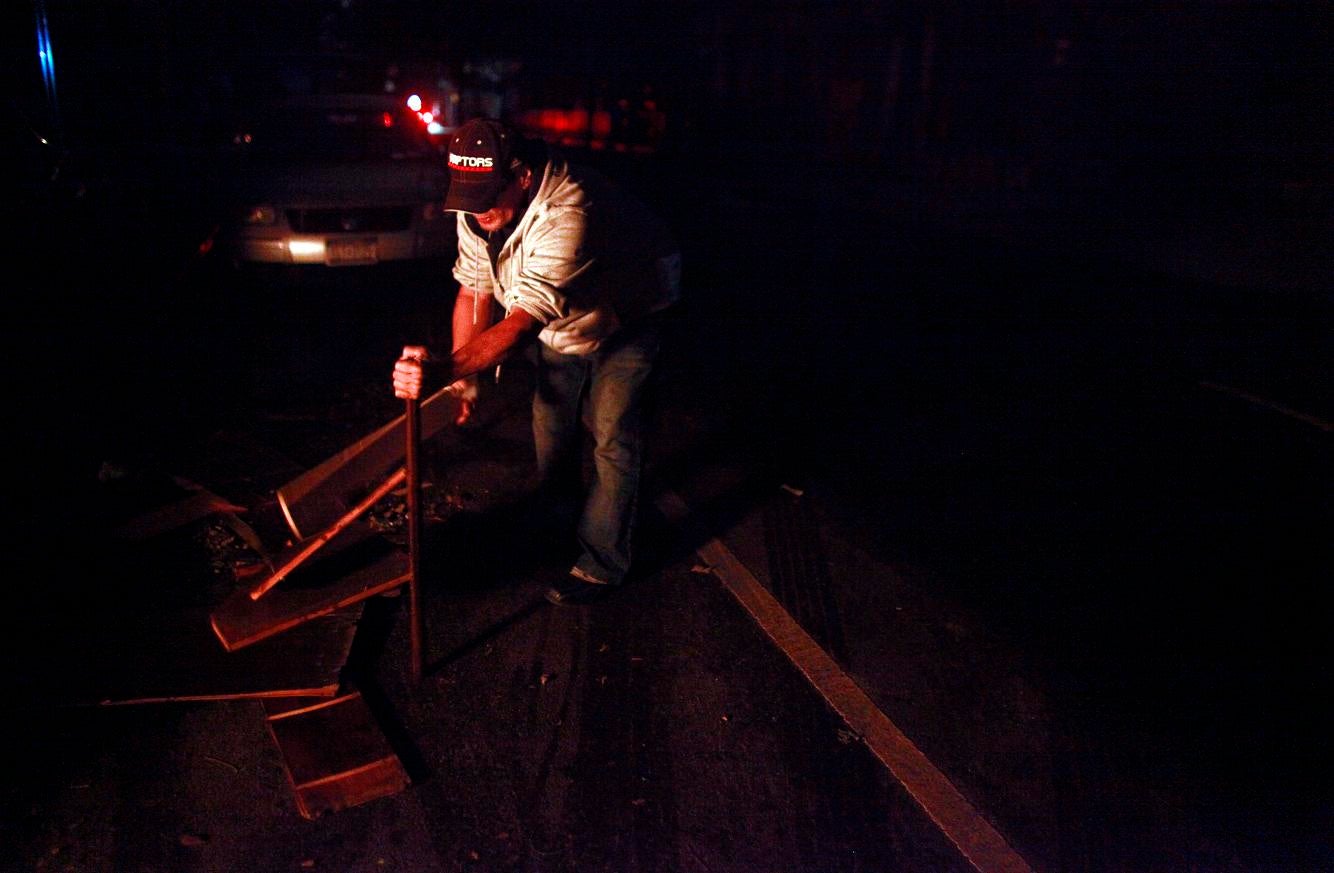Despite darkness, New Yorker stands up for his neighbourhood in superstorm's aftermath

Your support helps us to tell the story
From reproductive rights to climate change to Big Tech, The Independent is on the ground when the story is developing. Whether it's investigating the financials of Elon Musk's pro-Trump PAC or producing our latest documentary, 'The A Word', which shines a light on the American women fighting for reproductive rights, we know how important it is to parse out the facts from the messaging.
At such a critical moment in US history, we need reporters on the ground. Your donation allows us to keep sending journalists to speak to both sides of the story.
The Independent is trusted by Americans across the entire political spectrum. And unlike many other quality news outlets, we choose not to lock Americans out of our reporting and analysis with paywalls. We believe quality journalism should be available to everyone, paid for by those who can afford it.
Your support makes all the difference.Before the storm, it would have been a familiar setting here in lower Manhattan: a man behind the counter, a row of lottery tickets above him and a wall of cigarettes behind him.
On Wednesday, nothing about it was familiar. Even in daylight, the store was dark. The milk was spoiled. The electric ham slicer was not slicing ham. The slight stink of rotting lettuce was coming up from the basement.
And Atul Shah, owner of 7th Street Village Farm in the East Village, had not slept in two days.
Somehow, word had gotten out that despite not having power, Shah had C batteries for sale and cold beer from a slowly thawing freezer in the basement.
All day Wednesday, customers came into the darkness for bread, tuna, water, strawberry Nutrament, pound cake and cigarettes.
"Do you have toilet paper?" a man asked. From behind the counter, Shah, 49, beamed his flashlight at a four-pack of Charmin on the top shelf.
"Do you have ice?" another man asked. Unbelievably, Shah did, and more unbelievably, he was not price-gouging on ice or anything.
The man took the ice and bottles of water. "I'm not looking forward to 18 flights of stairs," he told Shah. Like all elevators affected by the power outage, his was out .
Shah heard a woman yelling from the doorway. "Are you guys giving out candy for the kids?"
The woman was holding the hand of a boy in a Darth Vader mask. In the post-craziness of the storm, nothing was surprising, but this was, until someone remembered. It was Halloween.
It was also 10 o'clock in the morning. Darth Vader's mother pointed out that there would be no light that night for trick-or-treating.
"You would think people would understand," said Alessia Diore, the boy's mother. Javier Castro, Shah's bleary-eyed employee, came out with two pieces of chocolate.
The market became the place to hear scraps of information. Customers were desperate for any word from the outside world. When is the power coming back on? How long are we supposed to live like this? Do other parts of the city have power?
It took a man with a solar-powered radio at home to deliver the news: the city was normal above 37th Street.
Stunned silence followed. Customers stood clutching their cans of Chef Boyardee and peanut butter, trying to absorb the fact that half the city was bathing in hot water, turning on lights and downloading "Game of Thrones."
Finally one guy broke the ice and accepted the news. "Aw, to hell with it," he said, setting his tall boy on the counter to pay.
The grumbling solidarity that had knit them so closely for the last days returned. They were tough New Yorkers.
Down below in the basement was stinking garbage. Rotting lettuce and fruit. Empty collapsed boxes stacked to the ceiling. No one knew when sanitation services would resume, but Shah thought the garbage was better down below than it would be on the sidewalk, ruining his curb appeal.
He had owned the store for only seven years. Right on the cusp of becoming a fixture of the neighborhood, Shaw wasn't about to blow it by closing for Sandy.
He and his wife, Sneha, had ridden out the storm inside the store. Neither slept during the worst of it. Instead, they sat on milk crates behind the counter. That was something new, as neither had ever experienced that vantage point.
"We always stand," Shah said.
They opened at 5:30 a.m. Tuesday and didn't quit until 2 a.m. the next day, when Mrs. Shah went home to Queens and Shah slept in his car outside the market.
By Wednesday afternoon he was hurting. The brace he wore for his bad right knee wasn't offsetting 18 hours of standing. He was limping, maxed out on a diet of Kind bars and chips and longing for something hot to eat.
Finally his wife and 24-year-old daughter, an accountant, arrived after their night of rest, and Shah was relieved for a few hours.
While he went home to Queens, to his bed and warm Punjabi curry, his wife and daughter kept the store open. There was also fresh bread, brought in from Queens by Shah's daughter.
"I want the club rolls, not the Italian," said a regular, Irene Arkin, 75. Another sign of a neighborhood coming back to life.
Join our commenting forum
Join thought-provoking conversations, follow other Independent readers and see their replies
Comments